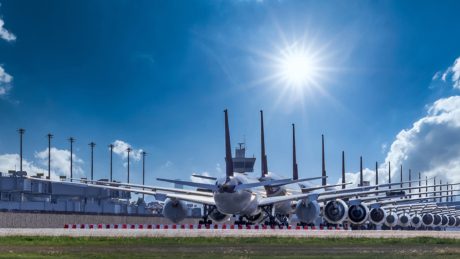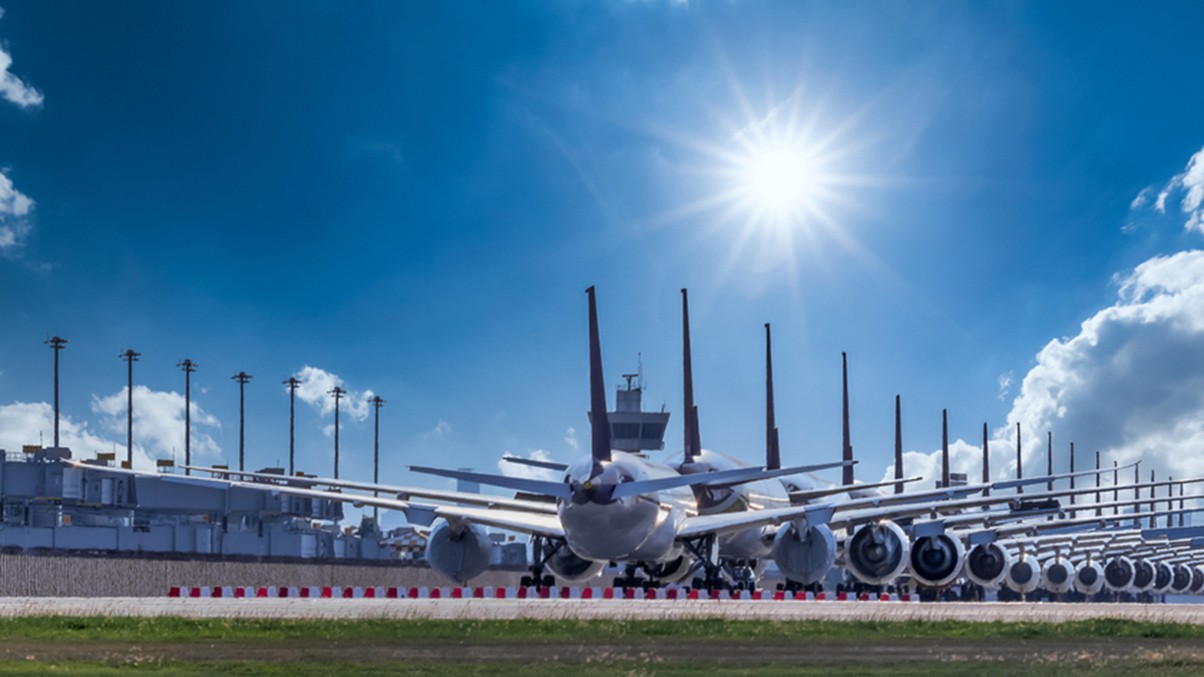2023 looks set to be an interesting year for the aviation industry, and it may provide some insight into the journey ahead towards net zero.
In the first part of this two-part article, Gemma Laing, Peter Neenan, Elaina Bailes and Alex Jay examined the technologies that may assist the aviation industry’s goal of achieving net zero carbon emissions by 2050. In this second part, we look at the wider impacts of decarbonisation on the aviation sector.
Increased costs
The challenge with many of these exciting technological advances towards decarbonising the aviation industry is cost. Hydrogen aircraft are much heavier and require more maintenance than normal jet-fuelled models, which means long-range hydrogen planes would demand a 40% increase in fuel energy and higher productivity costs. Furthermore, sustainable aviation fuels (SAF) are currently around three to five times more expensive than fossil jet fuel.
Absent a significant reduction in the costs of SAF to a figure more in line with jet fuel, many airlines will be unable to afford SAF and remain profitable. While jet fuel is a variable cost, it is one of the highest operating costs of any airline, accounting for around 25-30% of an airline’s annual operating costs. At even three times the cost of jet fuels, using SAF could result in fuel costs accounting for more than 50% of operating costs and significantly increase those costs. Any differential between the cost of SAF and jet fuels will directly impact the bottom line. Airlines that are not already highly profitable may struggle to meet this cost while still returning a net profit.
As technology advances, regulators may soon require commercial airlines to use higher levels of SAF or introduce low-emission aircraft. However, if the costs of these alternative fuels and engines remain high, it is likely to force operators to either increase costs for the consumer or cut costs in other areas, potentially impacting air safety. For example, there have been a growing number of recent instances where 5G signals have interfered with radar altimeters, which provide essential altitude information used for approaches and landings in commercial aircraft. Organisations such as the Federal Aviation Administration have been urging commercial operators to upgrade their altimeters to improve their tolerance to interference and assure air safety. The risk of increasing operating costs for the purposes of decarbonisation is that other issues like this may be sidelined as airlines struggle to keep their customers while maintaining profits. Regulators will need to balance the importance of the net zero strategy with air safety and consumer demand over the coming decades.
Greenwashing claims
As consumers become more environmentally conscious, companies are increasingly trying to capitalise on the growing demand for environmentally friendly products and services. This can be a positive step where businesses are making genuinely green changes and can back these up with legitimate facts and details. However, in some cases, the attempt to capitalise on the demand to be environmentally sound can result in a process called ‘greenwashing’. This occurs when companies make misleading or unsubstantiated claims to deceive consumers into believing their products or services are more environmentally friendly than they are.
While this is an emerging phenomenon in several industries, greenwashing is a specific issue in the airline industry, which was an early adopter of carbon offsetting programmes. Most major airlines have some kind of offsetting programme. These allow consumers to spend a bit more on their tickets to support programmes that aim to reduce carbon emissions, thereby supposedly reducing the overall carbon impact of their flights. Virgin Atlantic will be using carbon offsetting to achieve its ‘net zero’ flight across the Atlantic this year. However, such claims are coming under increasing scrutiny, with some airlines facing litigation over allegations they are misleading consumers about the reality of their carbon credits schemes and overall carbon neutrality.
One example of such litigation is the recent case brought in California against Delta Air Lines over its $1bn carbon neutrality claim. In 2020, Delta Air Lines announced its aim to go carbon neutral, including plans to purchase carbon credits from conserving areas such as grasslands, decreasing jet fuel use and increasing plane efficiency. The plaintiffs say the airline’s claims are misleading as they rely on carbon offsets that do little to mitigate climate change and global warming. In particular, the lawsuit focuses on Delta’s statement that it is “the world’s first carbon-neutral airline”, a statement made by company executives in LinkedIn posts and on in-flight napkins. Delta strongly denies these claims, affirming that the lawsuit is without legal merit. It is now up to a judge to decide whether to progress this case.
Even if this case is not progressed, a myriad of other claims is being brought in the US, UK and Europe against companies for making misleading green claims to their consumers. In July last year, environmental organisations filed the first greenwashing aviation lawsuit against Dutch airline KLM, alleging that the operator had promoted misleading sustainability information in its advertising. The claim focuses on KLM’s ‘Fly Responsibly’ campaign, which encourages consumers to offset their flights or donate money to fund ‘greener fuels’ to promote a sustainable future for aviation. They allege the campaign gives a false impression of KLM’s plans to tackle its impact on the climate and the sustainability of its flights.
On 7 June 2023, a Dutch court granted permission for the greenwashing lawsuit to proceed to a full hearing. This ruling is significant, as it demonstrates the viability of such claims and the risk of potential litigation for companies that make sustainability claims without sufficient evidence to support them. Given that the aviation industry is responsible for a large proportion of global carbon emissions and many businesses in the sector already have carbon-offsetting schemes and campaigns, the sector is at particular risk of being subject to increased numbers of greenwashing claims over the coming decade.
While there are currently no specific UK laws against greenwashing, certain consumer and business protection laws prevent companies from misleading consumers by falsely marketing themselves or their activities as green. These are set out in The Consumer Protection from Unfair Trading Regulations 2008 (SI 2008/1277) (CPUT) and The Business Protection from Misleading Marketing Regulations 2008 (SI 2008/1276) (BPRs).
There are, however, specific rules on making environmental claims set out in section 11 of The UK Code of Non-Broadcast Advertising, Sales Promotion and Direct Marketing (CAP Code) and section 9 of The UK Code of Broadcast Advertising (BCAP Code). These provide that the basis of environmental claims must be clear and unqualified claims could mislead if they omit significant information.
Other litigation issues
Claims for breach of fiduciary duty
As airlines are increasingly held to account for their environmental policies and contributions to climate change, there may be a rise in lawsuits against company directors relating to climate strategy. Failure to adequately disclose risks relating to a company’s carbon emissions and environmental impact may encourage investors or activists to bring legal action on the basis that directors have breached their fiduciary duty to incorporate environmental factors into decision making.
ClientEarth recently filed a derivative action in the High Court against the board of directors of Shell, alleging that the board has failed to manage material and foreseeable climate risks in breach of their directors’ duties under UK company law. Although this claim was recently denied permission to proceed on the basis that ClientEarth had failed to make a prima facie case for its claim (though an oral hearing to appeal that decision will now take place), this case demonstrates the increased viability of such actions and indicates a likely rise in similar actions in years to come.
Equally, an airline’s board may find itself between a rock and a hard place as, unless the costs of fuel alternatives like SAF significantly decrease, the airline may be unable to meet government emissions objectives without causing itself financial turmoil, potentially driving it towards insolvency. Airline boards will need to walk a careful tightrope between enforced regulation, public perception and cost viability to avoid shareholder actions for breach of fiduciary duty and mismanagement claims by creditors in any insolvency.
Regulatory compliance and investor claims
Failure to comply with the Carbon Offsetting and Reduction Scheme for International Aviation (CORSIA) requirements can already result in airlines facing high financial penalties. There will likely be an increase in regulation in this area over the coming decade. This will bring about a rise in claims against airlines by regulatory bodies trying to enforce regulations around decarbonising the industry.
Further, the regulatory requirements for listed companies to disclose and report on their environmental credentials in their published information may affect airlines whose parent companies are UK PLCs. Under s90 and s90A of the Financial Services and Markets Act 2002, shareholders have a right of redress for untrue or misleading statements and omissions in prospectuses or published information. If airlines misreport their strategies and activities in reducing emissions and on discovery suffer a fall in their share price, this could open them to such claims for losses incurred by shareholders.
Contractual disputes
To comply with future regulations, airlines and other companies in the aviation sector will probably need to establish new contracts to procure SAF and other decarbonisation products and services. As new relationships form between buyers and sellers in this sector, contract disputes may arise as both sides try to navigate the rapidly changing regulations.
Conclusion
It will be important for organisations in the aviation industry to adapt to changing regulatory and public attitudes that develop over the coming decades so that they can progress towards a more sustainable way of flying without losing customers, neglecting air safety or attracting litigation. It is difficult to predict whether the industry will meet its net zero target by 2050. However, despite its obvious challenges, it is clear many exciting new technologies are emerging that have great potential to pave the way towards a decarbonised future.
As decarbonisation of the aviation industry advances and regulation increases, it will be interesting to see how the litigation landscape changes and the kinds of claims and disputes that arise in the sector.
The Commercial Aviation Disputes team at Stewarts specialises in complex aviation disputes and can assist if you need legal advice in this area.
Commercial Aviation Disputes team at Stewarts
Stewarts has substantial experience in complex disputes arising from the aviation sector, drawing expertise from our market-leading Commercial Litigation, International Arbitration, Aviation, Insurance, Policyholder Disputes, Insolvency, and Sanctions teams.
You can find further information regarding our expertise, experience and team on our Aviation pages.
If you require assistance from our team, please contact us.
Subscribe – In order to receive our news straight to your inbox, subscribe here. Our newsletters are sent no more than once a month.








